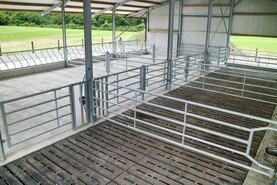Early housing has seen a spike in pneumonia problems with young calves and weanlings most severely affected.
As such, herd owners are advised to check livestock more often to pick up pneumonia as early as possible.
Reports indicate weanlings purchased at special sales over the past week are encountering severe respiratory problems when arriving back on farm.
Most of these issues are linked to the stress of abrupt weaning, transit through the live ring and the change of environment on arriving at the new holding.
Management
Every step should be taken to minimise the risk of pneumonia in the days immediately after housing. Avoid weaning and housing at the same time.
Give calves a couple of days to settle indoors before completing tasks like worming, vaccinating or weaning animals. If weaning, a gradual approach over a week is better than abrupt weaning.
If dosing for worms, using a white drench is often easier on calves than using clear drench products, especially when animals exhibit a heavy worm burden.
Clear drench products give a rapid kill of all parasites. This can trigger respiratory problems as the calves try to cough up a heavy burden of dead worms from the lungs.
Feed calves meal in the morning and again in the evening, along with a high dry matter forage. Calves that are slow to eat should always be checked for pneumonia problems.
Airflow
Fresh air is crucial after housing, especially with the current mild temperatures. Clipping calves along the head, neck and back will help animals regulate body temperature.
Avoid parking machinery in the feed passage as this will disrupt airflow in sheds housing young stock.
Read more
Weanlings peak at €3.70/kg at Thurles Mart weanling sale
Dairy management: weather woes on heavy land
Early housing has seen a spike in pneumonia problems with young calves and weanlings most severely affected.
As such, herd owners are advised to check livestock more often to pick up pneumonia as early as possible.
Reports indicate weanlings purchased at special sales over the past week are encountering severe respiratory problems when arriving back on farm.
Most of these issues are linked to the stress of abrupt weaning, transit through the live ring and the change of environment on arriving at the new holding.
Management
Every step should be taken to minimise the risk of pneumonia in the days immediately after housing. Avoid weaning and housing at the same time.
Give calves a couple of days to settle indoors before completing tasks like worming, vaccinating or weaning animals. If weaning, a gradual approach over a week is better than abrupt weaning.
If dosing for worms, using a white drench is often easier on calves than using clear drench products, especially when animals exhibit a heavy worm burden.
Clear drench products give a rapid kill of all parasites. This can trigger respiratory problems as the calves try to cough up a heavy burden of dead worms from the lungs.
Feed calves meal in the morning and again in the evening, along with a high dry matter forage. Calves that are slow to eat should always be checked for pneumonia problems.
Airflow
Fresh air is crucial after housing, especially with the current mild temperatures. Clipping calves along the head, neck and back will help animals regulate body temperature.
Avoid parking machinery in the feed passage as this will disrupt airflow in sheds housing young stock.
Read more
Weanlings peak at €3.70/kg at Thurles Mart weanling sale
Dairy management: weather woes on heavy land






 This is a subscriber-only article
This is a subscriber-only article











SHARING OPTIONS: